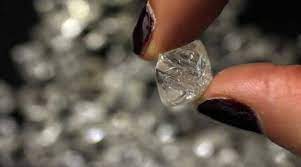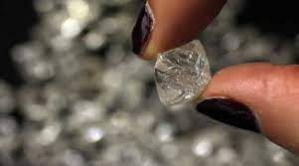Russia has thwarted a Western-backed initiative to investigate whether its diamonds are supporting war before of an international conflict diamond summit in Botswana, according to letters obtained by Reuters. The Russian effort was supported by Belarus, Central African Republic, Kyrgyzstan and Mali.
The schism in the Kimberley Process (KP), which verifies rough diamond exports, threatens to paralyse the organisation that takes decisions by consensus.
The letters, which have not previously been reported, show a disagreement over a proposal by Ukraine, the European Union, Australia, the United Kingdom, Canada, and the United States to discuss Russia's invasion of Ukraine and whether to broaden the KP's definition of conflict diamonds to include state actors at its June 20-24 meeting in Botswana.
The US and the UK have previously sanctioned Russia's Alrosa (ALRS.MM), the world's largest producer of rough diamonds, which accounted for about 30% of global output last year and is partially state-owned.
An hour-long discussion slot was proposed in a draught agenda dated May 20, but it was withdrawn after complaints from Russia, Belarus, the Central African Republic (CAR), Kyrgyzstan, and Mali.
"We find ourselves at an impasse," Botswana's KP chair Jacob Thamage told participants - who include 85 nations, industry representatives, and civil society organisations - in a June 9 letter urging them to find common ground.
Conflict diamonds, according to the KP, are jewels used to fund rebel movements trying to subvert legitimate governments.
To officially classify Russian diamonds as "conflict diamonds," the term would have to be expanded. For years, the KP Civil Society Coalition, together with some KP member countries, has advocated for such a shift.
The certification method was established in 2003 in the aftermath of disastrous civil conflicts in Angola, Sierra Leone, and Liberia, which were predominantly supported by the illicit diamond trade.
In a letter dated May 20, Russia's KP representative stated that the situation in Ukraine has "no ramifications" for the Kimberley Process and is "completely beyond the scope" of its certification scheme.
Belarus, Central African Republic, Kyrgyzstan, and Mali all contended that the idea was "political" or outside the mandate of the KP, and that its appearance on the agenda was therefore improper. In recent United Nations General Assembly votes, all four countries backed Russia.
War-torn CAR is now the only country in the world with a partial KP prohibition on rough diamond exports. Russia, with whom it has significant trade and security relations, has moved to remove the limitations.
Mali has strong links with Russia. Since the beginning of the year, hundreds of Russian military contractors have been deployed there to assist the government in combating rebels.
"If the Kimberley Process is to be a credible guarantor that diamonds exported with a KP certificate are actually conflict-free, it cannot refuse to consider the valid questions that have been raised about whether rough diamonds exported by Russia are financing its invasion of Ukraine," Canada's Ioanna Sahas Martin wrote to the KP chair earlier this month.
In a letter to the chair on Monday, Ukraine KP representative Andrii Tkalenko recommended two changes to the certification scheme: broadening the term to include government actors, and allowing KP countries to remove a country that violates the sovereignty of another KP member by a majority vote.
Russia should resign from the KP committees it now chairs, according to Britain, the European Union, and the United States.
"Inaction would undermine the credibility and integrity of the Kimberley Process not only as a conflict prevention mechanism but also as a trade regulation mechanism," the European Commission's Marika Lautso-Mousnier said in a letter.
(Source:www.usnews.com)
The schism in the Kimberley Process (KP), which verifies rough diamond exports, threatens to paralyse the organisation that takes decisions by consensus.
The letters, which have not previously been reported, show a disagreement over a proposal by Ukraine, the European Union, Australia, the United Kingdom, Canada, and the United States to discuss Russia's invasion of Ukraine and whether to broaden the KP's definition of conflict diamonds to include state actors at its June 20-24 meeting in Botswana.
The US and the UK have previously sanctioned Russia's Alrosa (ALRS.MM), the world's largest producer of rough diamonds, which accounted for about 30% of global output last year and is partially state-owned.
An hour-long discussion slot was proposed in a draught agenda dated May 20, but it was withdrawn after complaints from Russia, Belarus, the Central African Republic (CAR), Kyrgyzstan, and Mali.
"We find ourselves at an impasse," Botswana's KP chair Jacob Thamage told participants - who include 85 nations, industry representatives, and civil society organisations - in a June 9 letter urging them to find common ground.
Conflict diamonds, according to the KP, are jewels used to fund rebel movements trying to subvert legitimate governments.
To officially classify Russian diamonds as "conflict diamonds," the term would have to be expanded. For years, the KP Civil Society Coalition, together with some KP member countries, has advocated for such a shift.
The certification method was established in 2003 in the aftermath of disastrous civil conflicts in Angola, Sierra Leone, and Liberia, which were predominantly supported by the illicit diamond trade.
In a letter dated May 20, Russia's KP representative stated that the situation in Ukraine has "no ramifications" for the Kimberley Process and is "completely beyond the scope" of its certification scheme.
Belarus, Central African Republic, Kyrgyzstan, and Mali all contended that the idea was "political" or outside the mandate of the KP, and that its appearance on the agenda was therefore improper. In recent United Nations General Assembly votes, all four countries backed Russia.
War-torn CAR is now the only country in the world with a partial KP prohibition on rough diamond exports. Russia, with whom it has significant trade and security relations, has moved to remove the limitations.
Mali has strong links with Russia. Since the beginning of the year, hundreds of Russian military contractors have been deployed there to assist the government in combating rebels.
"If the Kimberley Process is to be a credible guarantor that diamonds exported with a KP certificate are actually conflict-free, it cannot refuse to consider the valid questions that have been raised about whether rough diamonds exported by Russia are financing its invasion of Ukraine," Canada's Ioanna Sahas Martin wrote to the KP chair earlier this month.
In a letter to the chair on Monday, Ukraine KP representative Andrii Tkalenko recommended two changes to the certification scheme: broadening the term to include government actors, and allowing KP countries to remove a country that violates the sovereignty of another KP member by a majority vote.
Russia should resign from the KP committees it now chairs, according to Britain, the European Union, and the United States.
"Inaction would undermine the credibility and integrity of the Kimberley Process not only as a conflict prevention mechanism but also as a trade regulation mechanism," the European Commission's Marika Lautso-Mousnier said in a letter.
(Source:www.usnews.com)






